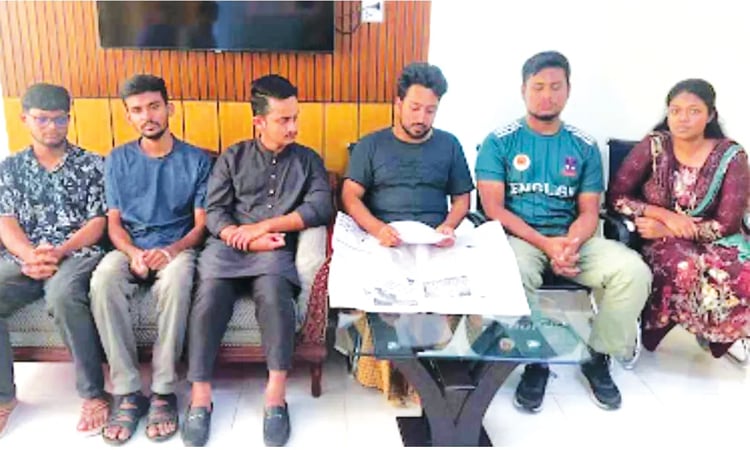News Flash

DHAKA, July 31, 2025 (BSS) - On August 1, 2024, dubbed as the July 32, Law enforcement agencies obstructed student protesters during the "Remembering Our Heroes" programme by the anti-discrimination student movement in different parts of the country. In some places, clashes erupted between police and demonstrators while several students were reportedly detained.
The quota reform movement, which turned violent from July 16, following six deaths in three districts in "police firing", had since been referred to by protesters as the "July Massacre."
Although on July 21, the Appellate Division overturned the High Court verdict and ruled in favor of quota reform, the ruling failed to quell public outrage.
The protesters announced they would continue to count the days of August as extensions of July until their demands were met. Thus August 1 was counted as "July 32," while it continued until August 5 as July 36 when the ousted prime minister Sheikh Hasina fled the country, making the student-people uprising a success.
On August 1, students observed the programme in the capital and across the country. Alongside students, teachers, lawyers and people from all strata joined the programme in different parts of the country.
That day, students of the Public Administration Department at Dhaka University brought out a protest procession from the Central Shaheed Minar premises, expressing solidarity with the anti-discrimination movement's nine-point demands.
Earlier that morning, teachers and staff from the same department staged a sit-in programme at the foot of the university's Aparajeyo Bangla sculpture, condemning the attacks and repression against teachers and students.
Besides, the "Remembering Our Heroes" programme was also observed in different universities across the country, including Sher-e-Bangla Agricultural University, Jahangirnagar University, Shahjalal University of Science and Technology (SUST), Barishal University, Rajshahi University and Islamic University in Kushtia.
Earlier, on July 31, the anti-discrimination student movement announced the "Remembering Our Heroes" programme to commemorate those who were killed and injured during the quota reform movement through memorial meetings, graffiti, wall writings and festoons.
On August 1, however, the movement leaders declared a nationwide 'prayers and mass rallies' for August 2 in remembrance of those who were killed, injured, disabled and arrested during the quota reform protests.
One of the key-coordinators of the movement Abdul Kader declared the programme through a statement on August 1 evening.
The statement read, "We are calling upon the people from all walks of life across the country to offer special prayers at all mosques after Jumu'ah and in other places of worship at a suitable time and visit the graves of the martyrs tomorrow".
It also said that mass rallies would be held across the country in protest against the massacres and mass arrests and in favour of their nine-point demands.
Earlier in the day, six coordinators of the anti-discrimination student movement were released from the custody of the Detective Branch (DB) of Dhaka Metropolitan Police. Around 1:30pm, they left the DB office in a government vehicle.
Nahid Islam's father, Badarul Islam, said that family members of all six coordinators were asked over phone to go to the DB office that morning while the coordinators were released and reached their homes by DB's own transport.
Badrul, however, said the six coordinators observed a hunger strike for last two-days in the DB custody.
Later that afternoon, the Ministry of Home Affairs, through an executive order under Section 18(1) of the Anti-Terrorism Act, issued a gazette notification banning Bangladesh Jamaat-e-Islami and its student wing Islami Chhatra Shibir.
Meanwhile, on August 1, the pro-Awami League Blue Panel of Dhaka University held a press conference on the overall situation at DU and across the country. In a written statement, they claimed that the core demands of the student protesters had already been met and urged students to withdraw from the movement.
Teachers at Begum Rokeya University, Rangpur, however, demanded justice for all those killed during the quota reform movement, including Abu Sayeed and called for ensuring student safety and restoring a healthy academic environment.
In New York, Bangladeshi-Americans staged a protest in front of the United Nations (UN) Headquarters, condemning the killings, violence, torture and arrests during the student protests in Bangladesh. They demanded justice and urged expatriates to halt sending remittances as a form of protest.
Meanwhile, Shushashoner Jonno Nagorik (SHUJAN) stated that the then government had no public mandate. Therefore, the government had no right to remain in power because of the injustice it had committed.
Besides, on the same day, responding to Sheikh Hasina's appeal, the United Nations stated that it was ready to assist Bangladesh in investigating the violence and casualties that took place during the quota reform movement. UN Secretary-General's spokesperson Stephane Dujarric had confirmed the organization's willingness to provide support as needed.
The Cabinet Division also issued a gazette notification forming a new commission of inquiry, comprising three High Court judges, to investigate the incidents of death, violence, sabotage, arson, looting, terrorism and damage that took place from July 16 to July 21 during the quota reform protests.